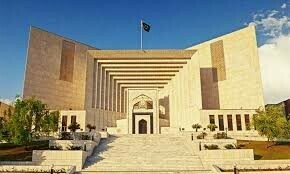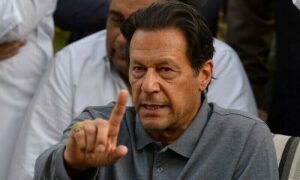The Supreme Court on Thursday took up the Punjab government’s urgent application seeking omissions of certain portions from its July 24 verdict in the Mubarak Ahmad Sani case.
On February 6, a two-judge SC bench, led by Chief Justice of Pakistan Qazi Faez Isa, overturned the conviction of Mubarak Sani, who was accused of an offence in 2019 under the Punjab Holy Quran (Printing and Recording) (Amendment) Act.
In its judgement, the court noted that the offence that the defendant had been accused of was not criminalised till 2021. Consequently, the apex court set aside the conviction and ordered the immediate release of the petitioner.
This led to what the government and the legal community termed a “malicious and slanderous campaign” against the CJP, even prompting the Supreme Court to issue a clarification.
The decision was subsequently challenged by the Punjab government on the grounds that paragraph 9 of the order, regarding Article 20 of the Constitution, needed to be modified as the rights of the citizens as envisaged under the provision were not absolute and instead subject to law, public order, and morality.
While accepting the pleas, the Supreme Court on July 24 reportedly declared that the right to profess religion and religious freedom, as ensured by the Constitution, was subject to law, morality, and public order.
The judgment had emphasised that complete faith in the finality of the prophethood of the Holy Prophet (PBUH) was the very foundation of Islam — a belief without which nobody can be described as a Muslim.
However, earlier this month, the Council of Islamic Ideology (CII) expressed its reservations over a number of reasons given in the SC’s second judgment. Expressing the hope that the SC “will soon review its decision”, the CII had urged the government to play an effective role in the matter.
Various groups, including religio-political parties, have voiced their objections by carrying out rallies and even breaching the apex court’s security as they held protests.
The matter has come under discussion in the National Assembly by both the treasury and opposition benches, while the KP Assembly had also unanimously passed a resolution expressing concern over the SC verdict.
Subsequently, on August 17, the Punjab government filed an application seeking corrections that some clerics deemed were needed in the SC’s July 24 clarification.
According to the petition, some leading clerics and members of parliament requested the federal government to approach SC and highlight some portions of the verdict that they say merited correction. The application explains that some observations and findings contained in some other paragraphs of the judgment appeared to be an accidental error and contrary to the precedents as mentioned by the top court.
Today’s hearing
Today, a three-member bench — led by CJP Isa and including justices Irfan Saadat Khan and Naeem Akhtar Afghan — took up the Punjab government’s petition.
Jamiat Ulema-i-Islam—Fazl (JUI-F) chief Maulana Fazlur Rehman — one of the religious scholars who had requested the government to seek another review of the ruling — appeared before the court
Attorney General for Pakistan (AGP) Mansoor Usman Awan was also present during the hearing while prominent religious scholar Mufti Taqi Usmani appeared via video link.
At the outset of the hearing, AGP Awan informed the bench that the Parliament and some clerics had asked the federal government to approach the SC regarding the matter.
He further said that a letter was received from the NA speaker and directives were also issued by Prime Minister Shehbaz Sharif. Admitting that a “second review” of the original verdict could not be held, the AGP noted that hence, the government had approached the court as per the Code of Civil Procedure.
AGP Awan urged the court to hear clerics’ arguments since the matter was a religious one.
“I don’t want to say but am helpless; I pray in every prayer that may God not make me make any wrong decision,” CJP Isa said. “A person is known by their actions and words,” he observed.
The chief justice stressed that the Parliament’s words were highly respected by the court.
The court then decided to seek assistance from clerics present in the courtroom, including Fazl, Mufti Sher Muhammad, Sahibzada Abul Khair, Muhammad Zubair and Jamaat-i-Islami’s Fareed Paracha.
CJP Isa then noted that the court had also sought assistance from Mufti Taqi Usmani but he was in Turkiye. Therefore, the scholar joined via video link. Mufti Muneebur Rehman’s representative was also present.
More to follow







